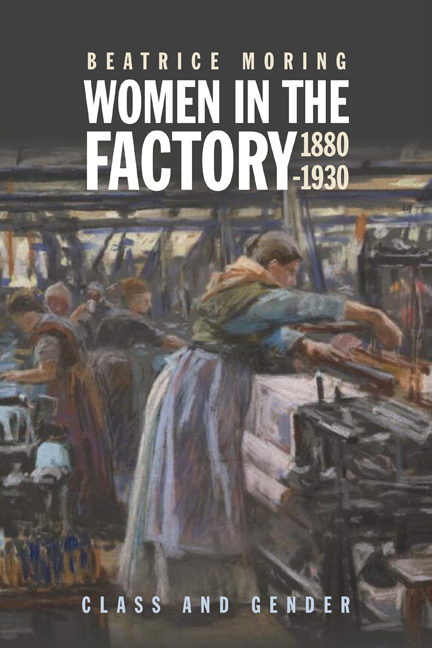Book contents
- Frontmatter
- Contents
- List of Illustrations
- Introduction – Why Women in the Factory?
- 1 Gender And Class – Male Unions, Political Movements and the Female Vote
- 2 Women in Industry: Work, Sectors, Age and Marital Status
- 3 Women, Earnings and the Household – Why the Factory?
- 4 Accidents, Compensation, Laws and Inspection
- 5 Middle Class Girls, Education and Entry into the Civil Service
- 6 The Female Factory Inspectors – How, Why and Who
- 7 Factory Inspection Activity
- 8 Class, Gender and Communication
- Conclusion
- Appendix 1 The Right for Women to Vote in National Elections
- Appendix 2 Women in the Workforce
- Appendix 3 Women, Work, Earnings and Family
- Appendix 4 Accidents, Workplace Acts and Regulations
- Appendix 5 Education
- Appendix 6 Female Inspectors
- Appendix 7 Inspectors, Activity
- Appendix 8 The Female Inspectors and Society
- Bibliography
- Index
Appendix 6 - Female Inspectors
Published online by Cambridge University Press: 09 May 2024
- Frontmatter
- Contents
- List of Illustrations
- Introduction – Why Women in the Factory?
- 1 Gender And Class – Male Unions, Political Movements and the Female Vote
- 2 Women in Industry: Work, Sectors, Age and Marital Status
- 3 Women, Earnings and the Household – Why the Factory?
- 4 Accidents, Compensation, Laws and Inspection
- 5 Middle Class Girls, Education and Entry into the Civil Service
- 6 The Female Factory Inspectors – How, Why and Who
- 7 Factory Inspection Activity
- 8 Class, Gender and Communication
- Conclusion
- Appendix 1 The Right for Women to Vote in National Elections
- Appendix 2 Women in the Workforce
- Appendix 3 Women, Work, Earnings and Family
- Appendix 4 Accidents, Workplace Acts and Regulations
- Appendix 5 Education
- Appendix 6 Female Inspectors
- Appendix 7 Inspectors, Activity
- Appendix 8 The Female Inspectors and Society
- Bibliography
- Index
Summary
Debates about women and the position of authority
When the question of appointing female inspectors arose it raised a number of objections.
The chief inspector of factories said (1879) ‘I doubt very much whether the office of factory inspector is suitable for women …’ The problem was not only ‘the general and multifarious duties of an inspector of factories would really be incompatible with the gentle and home-loving character of a woman’ but the fact that ‘Factory inspecting requires activity and acumen and the stern authority of a man to enforce obedience to his interrogatories … and a female inspector having to submit herself in the witness-box to the cross-examination of an astute attorney …’1 The profession was visualized as giving orders in the factory and disputing with lawyers in court with a good portion of confrontation, therefore, a male prerogative.
The problem was seen to be part of differences in approach to problems by men and women. For example, the 1833 Factory Inquiry in Britain revealed that, while male mule spinners regularly hit their adolescent and child assistants with a strap to keep them working, the female mule spinners gave them food, or pennies to promote results. The strong arm wielding the strap was one of the reasons for male preference by manufacturers. Similarly this was viewed as a reason why female foremen should not be appointed.
The strong-arm tactics still flourished in the 1890s. Adelaide Anderson gave an example of the deplorable level male foremen could sink to when exercising discipline: In 1895, a textile factory foreman turned a fire hose on a group of girls as a measure of discipline, chasing them into a vestibule, after which they had to walk home (in March) dripping with cold dirty water. Forty girls were subjected to this treatment. After examining the girls, the inspector made a complaint, but had no power to demand punishment of the foreman, apart from getting an apology, nothing could be done. She saw this as an example of the restricted powers awarded inspectors in the early days and the structural problems of female workplaces employing male foremen, who could resort to abusive methods and violence to preserve their authority.
- Type
- Chapter
- Information
- Women in the Factory, 1880-1930Class and Gender, pp. 258 - 261Publisher: Boydell & BrewerPrint publication year: 2024



